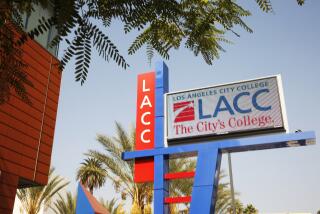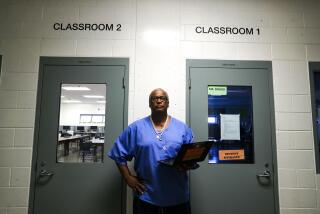Volunteerism by Degree: A Class Act
- Share via
PROVIDENCE, R.I. — When she saw the wonder on the faces of the deaf children, Rebecca Dunphey knew she had made the right choice when she switched her college major to community service.
“It’s so amazing to watch the kids and see how much they learn from you,” said Dunphey, who used sign language skills to design an AIDS education course. “It’s very exciting.”
The 22-year-old from South Portland, Maine, is one of the first seven graduates from Providence College’s Feinstein Institute for Public Service, the country’s only degree program in community service.
The goal of the 3-year-old institute is to create leaders for the next generation of volunteers.
“We’ve got a consumer culture, where everyone is striving to get ahead of everyone else,” said Dunphey, who switched her major from psychology. “We should get back to the attitude where people genuinely care and have concern for their neighbors.”
The call to community service has increased in recent years, starting with former President Bush’s “1,000 points of light” and including President Clinton’s AmeriCorps, the youth service corps where participants receive a living allowances and nearly $5,000 a year for college.
In April in Philadelphia, community service was the focus of the Presidents’ Summit for America’s Future.
“I think there’s a desire in young people to provide to their community. It’s a rebirth in idealism,” said Rick Battistoni, director of the 50-student institute at private Providence College.
Dwindling involvement in traditional volunteer efforts and cuts in government social programs gave rise to the program, which involves professors in multiple subjects. Course work is mixed with community involvement, such as tutoring and working in homeless shelters.
Juniors and seniors learn leadership skills by teaching freshmen and sophomores, and each senior must design a community project.
One senior, who was on the college’s tennis team, created a tennis camp for inner-city children. Another senior worked in the prison system to help those about to be released, and a third created a program that mixes drama and education.
The institute was founded with a $5-million donation from Alan Shawn Feinstein, who also provided money for the Feinstein High School for Public Service in Providence.
“I think this is the first time in history where parents cannot automatically expect a better future for their children than they had,” Feinstein said. “If there is going to be a better future, people will have to work together to lift up our country.”
But will there be jobs for the community service graduates?
If the corporate involvement in the April summit is any guide, businesses are ready, said Bill Barrett, spokesman for the Corporation for National Service, which oversees AmeriCorps, the Senior Service Corps and Learn and Serve America, which provides grants to schools to incorporate community service into the curriculum.
“I think there is growing interest in the corporate community in being part of the service movement,” he said.
Amy Pettine, 21, of Fall River, Mass., switched into the community service program after studying management for two years. “I plan to influence change,” she said.
Pettine’s senior project involved helping nonprofit groups to more efficiently provide services to the needy.
“In an ideal world we wouldn’t need service, it would just be inherent in the system,” she said. “I feel like I’m majoring in something that shouldn’t have to exist.”
More to Read
Sign up for Essential California
The most important California stories and recommendations in your inbox every morning.
You may occasionally receive promotional content from the Los Angeles Times.










